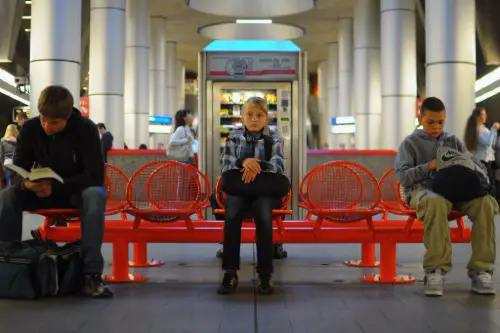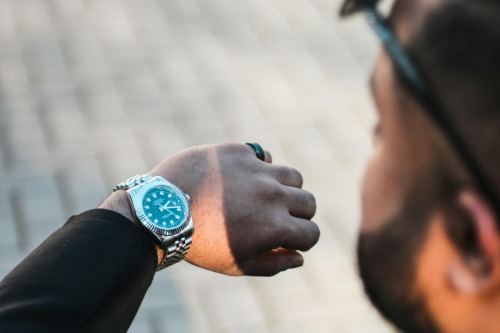1. Personal space is sacred

From an early age, Americans are taught to keep a respectful distance from others, according to Frank Bures from Rotary International. Getting too close—whether in line, in conversation, or on public transit—feels uncomfortable and intrusive. The “bubble” of personal space is real, and it varies by situation, but it’s always there. Invading it is seen as rude or even threatening.
This is different from many cultures where physical closeness signals connection or friendliness. In the U.S., physical boundaries reflect emotional and social ones. Kids learn phrases like “Give me some space!” and take them seriously. It’s one of those invisible rules you notice only when someone breaks it.
2. Don’t talk politics at the dinner table

From a young age, Americans are taught—often indirectly—that dinner is a time for peace, not debate, according to Carlota Cano from The Berkeley Beacon. Politics is considered too divisive for polite company, especially during holidays. The idea is that disagreements over hot-button issues like healthcare, gun rights, or immigration can ruin a perfectly good turkey dinner. So, even when family members feel strongly, they usually bite their tongues.
This “rule” is less about repression and more about preserving relationships. Families often span political lines, and harmony tends to win out over argument. It’s an unspoken social contract: let the mashed potatoes be neutral territory. Many Americans continue this habit into adulthood, especially in mixed company.
3. Always smile in public—even if you don’t mean it

Smiling is practically a reflex in the U.S., especially in customer service or casual encounters. Americans are taught that friendliness is a virtue, and smiling helps create a positive first impression, according to Olga Khazan from The Atlantic. This doesn’t always reflect genuine emotion, but rather a cultural value of approachability. Compared to other countries, this can seem overly cheery or even fake.
Children learn early that smiling gets you praise, attention, or better service. It’s part of a social currency in American life. If you don’t smile, people might think you’re rude or having a bad day. So people often put on a smile, even if they’re stressed or unhappy inside.
4. You can return almost anything, and no one will question it

America has one of the most generous return cultures in the world, according to Jocelyn Mackie from Terms Feed. From clothes to electronics to half-used shampoo, retailers will often accept returns with barely a question. Kids watch their parents do it and quickly learn that “customer is king” is more than just a phrase. It’s a real, almost sacred part of consumer life.
This teaches young Americans that businesses are supposed to bend over backward to keep customers happy. The return policy is so standard that people take it for granted. It also builds a sense of entitlement that might not fly in other countries. But in the U.S., it’s just how things work.
5. Don’t talk about money, even if it’s about saving it

While Americans talk openly about buying things, discussing how much money you make—or don’t make—is taboo, according to Joe Pinsker from The Atlantic. Children learn not to ask adults about their salary, rent, or the cost of big purchases. It’s considered impolite, intrusive, or even shameful. Oddly, it’s okay to brag a little about wealth, but not to be transparent about financial details.
This rule reinforces individualism and privacy, cornerstones of American culture. People are expected to manage their own finances without public input or judgment. The silence around money can also lead to misunderstandings and inequality, but the rule persists. Many grow up without ever knowing what “normal” earnings or expenses look like.
6. Don’t be the first to take the last slice

Whether it’s pizza, cake, or a plate of cookies, Americans have an odd ritual around the last piece. Even if everyone wants it, they hesitate to take it. It’s a modesty move—a way to signal generosity or politeness. Taking the last slice without asking can come off as greedy.
This unspoken rule is all about social harmony. It shows you’re thinking of others and not just yourself. Sometimes people will break the tension by offering to “split it,” even if it’s clearly not shareable. Kids pick up on this fast, especially at birthday parties or school lunches.
7. You’re supposed to tip—even if the service is bad

Tipping is practically baked into American dining culture. Even though it’s technically optional, everyone knows you’re expected to leave 15–20%, and more for great service. This is because many service workers earn below minimum wage and rely on tips to make a living. But no one really tells you that when you’re little—you just see it happen over and over.
Kids watch their parents slide bills under the receipt or do quick math to hit the “right” amount. They learn that tipping isn’t a reward—it’s part of the deal. Complaining about tipping makes you seem stingy or out-of-touch. Even bad service often gets a baseline tip because not tipping at all is socially frowned upon.
8. Don’t show up at someone’s house unannounced

In many American households, you’d never just “drop by” without texting or calling first. It’s seen as an invasion of privacy or poor planning. Even if people are home, they might not feel “ready” for guests. This rule is so strong that an unexpected doorbell can trigger anxiety.
Children quickly absorb this norm from how their parents react to surprise visitors. It’s tied to the high value Americans place on autonomy and control over their personal time. Being unprepared is almost embarrassing, so scheduling is the polite way to interact. Social spontaneity exists, but only within planned frameworks.
9. Don’t stare—even if something’s really weird

In American culture, staring is considered rude, even if your curiosity is totally innocent. Kids are often scolded with “Don’t stare!” when they notice someone who looks or acts differently. The idea is to respect other people’s privacy, even in public. You’re supposed to look away, not make someone feel like a spectacle.
This rule teaches empathy and discretion, but also suppresses natural curiosity. It’s rooted in the belief that everyone deserves their dignity, no matter how unusual they seem. Americans generally value blending in rather than drawing attention. So while you may have questions, you’re expected to keep them to yourself.
10. Compliment sandwiches are a thing

Americans are pros at giving criticism sandwiched between two compliments. It might sound like, “You did such a great job on this report. Just fix these three parts. But overall, really solid work!” This method is so common it has a nickname: the “compliment sandwich.”
Kids experience this early in school and sports, where encouragement is emphasized. It’s meant to soften the blow of negative feedback and keep morale high. While it can seem disingenuous, it reflects a cultural emphasis on positivity. You learn quickly that people often don’t say exactly what they mean, but how they say it really matters.
11. You should always pretend you’re “doing great”

When someone asks, “How are you?”, the correct answer is almost always “Good!” or “Great!”—even if you’re not. Americans learn early that this question isn’t really about sharing your feelings. It’s more of a ritual greeting than a true check-in. Saying something negative can make people uncomfortable or come off as oversharing.
This rule promotes emotional self-sufficiency and keeps conversations light and quick. It reflects a broader cultural tendency to avoid burdening others with personal struggles. Children hear adults give the same upbeat answer over and over, and mimic it. Over time, it becomes automatic, even on your worst days.
12. You don’t show up early—you show up “on time”

Being early in American culture isn’t always seen as polite—it can actually catch people off guard. You’re taught that “on time” usually means within a five-minute window of the stated hour. Arriving too early can feel like you’re pressuring your host or disrupting their prep time. It’s all about respecting people’s schedules.
Children are taught that punctuality equals responsibility, but they also see the importance of not being too eager. It’s especially true for things like job interviews, parties, or appointments. The balance is subtle: not late, not too early, just right. It reinforces the value Americans place on time management and personal boundaries.
13. Don’t brag too much—but also don’t downplay too hard

There’s a weird balancing act in how Americans are expected to talk about their achievements. You’re supposed to be confident, but not cocky. Bragging outright is frowned upon, yet total modesty can seem fake or insecure. So kids learn to casually sprinkle in accomplishments without sounding like they’re trying too hard.
This norm teaches people to self-promote with finesse, especially in competitive settings like school or work. Saying “I was lucky to get into that program” instead of “I worked really hard” is common. It’s part of the American social code where likability often trumps credentials. You’re expected to shine—but with a humble filter.
14. If someone sneezes, you have to say “Bless you”

Even if you don’t know the person, or don’t believe in blessings, it’s considered polite to say “Bless you” when someone sneezes. Not saying it can make you seem cold or rude. Kids learn this almost immediately in school, and teachers often reinforce it. No one really explains why—it’s just something you do.
The origin of the phrase is historical and partly superstitious, but now it’s more about manners. It’s a small, expected kindness in everyday life. Strangers in elevators, coworkers in meetings—it doesn’t matter, the “bless you” comes out instinctively. The silence after a sneeze, on the other hand, is awkwardly noticeable.
15. You should always act busy, even when you’re not

Busyness is a form of social capital in the U.S. Saying you’re “just chilling” can be seen as lazy or unambitious, especially in adulthood. Kids watch adults constantly talking about their packed schedules, and the lesson sinks in fast. Doing a lot—even too much—is almost a badge of honor.
This mindset can start as early as school, where being overbooked with sports, clubs, and homework is the norm. The phrase “I’ve been so busy” becomes a default excuse for everything. It reinforces the American emphasis on productivity and hustle culture. Even rest has to be “earned” or strategically explained.
16. Say “sorry” even if it’s not your fault

In American culture, saying “sorry” is often more about smoothing things over than taking real blame. People apologize to avoid conflict or make others feel comfortable. Kids especially learn to say it quickly when someone is upset, even if they didn’t cause the problem. It’s a tool for social harmony, not guilt.
This rule helps keep interactions polite, especially in public spaces or tense moments. You might say “Sorry!” if someone bumps into you. It’s more about empathy than accuracy. The goal is often to keep things moving and avoid confrontation.
17. Don’t finish your drink too fast at a party

In social settings—especially with alcohol—nursing your drink is an unspoken sign of control. Downing your drink quickly can come off as immature or desperate, especially at formal events. People may joke about “lightweights,” but they notice. Kids eventually see this rule modeled at weddings, family functions, or on TV.
Pacing yourself is tied to American ideas of restraint and composure. It’s also a subtle way of keeping up socially without overindulging. If you’re always the first to ask for another, you risk standing out in the wrong way. The rule is: keep it casual, not chaotic.
18. Don’t make a big deal about other people’s food

If someone’s eating something you think is weird, you’re not supposed to say so. Even if it’s unfamiliar or smells strong, commenting on it negatively is a faux pas. Kids learn this in school lunchrooms when they see cultural differences in meals. Making someone feel “othered” because of their food is a quick way to seem rude.
This rule reinforces inclusivity and respect for diversity. Food is personal and often tied to identity. While Americans love to share their own food traditions, they’re expected to stay polite about everyone else’s. “Interesting” becomes the safe stand-in for what they’re really thinking.
19. You clap even if the performance wasn’t great

Whether it’s a school recital, work presentation, or awkward toast, you still clap. Politeness often wins out over honesty in public feedback. Americans are trained to encourage effort, not just results. Kids absorb this fast during talent shows, sports games, and spelling bees.
The act of clapping is about participation and support, not necessarily quality. It helps people save face and maintain morale. You might even clap harder to help someone recover from embarrassment. It’s all part of the “we’re all in this together” performance spirit.
20. You don’t ask people their age—especially adults

Asking someone how old they are, particularly if they’re over 30, is considered rude. It’s tied to American sensitivities around aging, beauty, and status. Children are taught to avoid this question unless it’s clearly okay to ask. Even birthday talk can get vague—“30-ish” becomes a thing.
This norm reflects cultural discomfort with aging and the tendency to associate youth with value. It also protects people’s privacy in social and professional settings. Adults might joke about getting older, but rarely want to spell it out. Kids notice that age becomes more secretive the older you get.
21. Don’t make things “too awkward”—even if the truth is important

Americans are often more concerned with keeping things light than getting to the uncomfortable truth. If something’s going to cause a scene, it’s often better to sidestep it. This “avoid awkwardness at all costs” rule starts young, especially in school and social groups. Calling out bad behavior, asking hard questions, or showing strong emotion can all be seen as overstepping.
This norm encourages emotional restraint and indirect communication. It’s not that Americans don’t care—it’s that they often don’t want to make others uncomfortable. The downside is that real issues sometimes get ignored for the sake of harmony. But the rule holds strong: don’t rock the boat unless you really have to.


